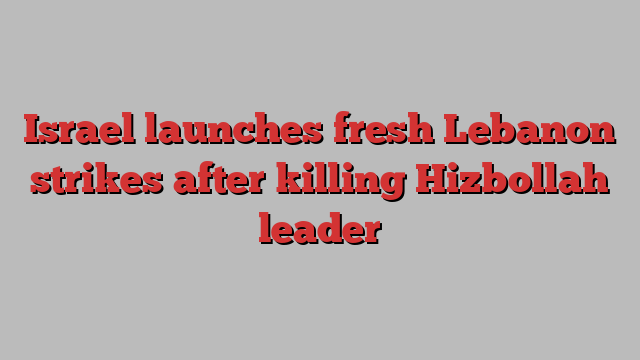
Unlock the Editor’s Digest for free
Roula Khalaf, Editor of the FT, selects her favourite stories in this weekly newsletter.
Israel launched dozens of fresh strikes in Lebanon on Sunday and vowed to keep up its offensive against Hizbollah after assassinating the militant group’s leader Hassan Nasrallah in Beirut.
People in Lebanon were braced for more attacks as the Israeli army issued new evacuation orders to civilians, including residents of south Beirut, and Prime Minister Benjamin Netanyahu insisted that despite killing the influential Hizbollah leader, Israel’s “work has still not been completed”.
Netanyahu said Israel would continue its fight against the Iran-backed militant group until it had succeeded in “changing the balance of power” in the Middle East and until about 60,000 residents of northern Israel, displaced by a year of cross-border fire, were able to return to their homes.
Israel’s military continued to target Hizbollah leaders, after killing Nasrallah in a massive strike on Friday in the southern Beirut suburb of Dahiyeh that the country’s defence minister hailed as “one of the most important assassinations in the history of the State of Israel”.
On Sunday, the Israel Defense Forces said they had killed Nabil Qaouk, a member of Hizbollah’s central council, who was sanctioned by the US in 2020 for his key role in the organisation.
Qaouk was believed to be in the running to replace Nasrallah after his death. The IDF said Qaouk was killed on Saturday, but did not say where. It said Qaouk was “directly involved in terrorist attacks against the State of Israel and its citizens, even in recent days”, adding that Israel would continue to target Hizbollah’s top echelons.
Israel’s offensive, including an intense bombing campaign that began on Monday, has killed more than 1,000 people across Lebanon in the last fortnight, according to the Lebanese health ministry. The last week has been one of the country’s deadliest since Israel fought a 34-day war with Hizbollah in Lebanon in 2006.
Lebanon said on Sunday it had been hit with 216 air strikes in the past 24 hours. The bombing levelled more homes in Lebanon’s eastern Bekaa Valley and southern provinces. Six bodies were pulled from beneath the rubble of a single home in the village of al-Ain, Lebanese state news reported. At least four paramedics were killed.
Hundreds of thousands of Lebanese civilians have been displaced, many fleeing to the already densely populated capital, sleeping in schools, on beaches and in the streets.
The constant thrum of Israeli drones has sounded over neighbourhoods across Beirut and far beyond its southern suburbs since Nasrallah’s assassination on Friday night.
On Saturday, the IDF claimed to have killed Hassan Khalil Yassin, describing him as a top member of Hizbollah’s intelligence department responsible for selecting targets in Israel.
Lebanon’s Prime Minister Najib Mikati declared three days of official mourning for Nasrallah starting on Monday, with all public and private institutions to stop work on the day of his funeral.
After Nasrallah’s death, US President Joe Biden said “the United States fully supports Israel’s right to defend itself against Hizbollah, Hamas, the Houthis, and any other Iranian-supported terrorist groups”, but added Washington hoped to de-escalate the conflict “through diplomatic means”.
Israel has raised the prospect of a ground offensive into southern Lebanon, where Hizbollah has a network of bases and weapons stores.
Late on Saturday, Israeli defence minister Yoav Gallant issued a statement saying he was making “an operational situation assessment regarding the expansion of IDF activities in the northern arena”, where Israel has previously mobilised at least two brigades. He did not say what that expansion could entail.
Israeli air strikes have also pushed tens of thousands of civilians to flee to neighbouring Syria, which is itself grappling with effects of a decade-long civil war. Lebanese state security recorded more than 41,300 of the country’s citizens and 36,000 Syrians crossing into Syria in the past week.
Hizbollah and other members of the Iran-led “axis of resistance” continued to fire on Israel overnight. Hizbollah said that in response to Israel’s “brutal violation” of Lebanese cities, villages and civilians, it had attacked multiple targets in northern Israel including a military camp with Fadi 1 rockets.
Most rockets were intercepted or landed in open areas. A rocket landed in an open area near the Israeli settlement of Mitzpe Hagit in the occupied West Bank, starting a fire.
The IDF said an Israeli warship intercepted a drone that approached Israel from the Red Sea on Saturday, triggering alarms in the southern resort and port city of Eilat. The Islamic Resistance in Iraq claimed responsibility for the attempted attack.